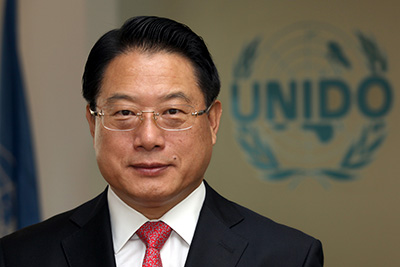Written by
LI Yong, UNIDO Director General
The COVID-19 pandemic has been the most disruptive in a century, putting an immense strain on societies and economies around the globe, and thereby jeopardizing the achievement of the 2030 Agenda for Sustainable Development.
The global drop in consumer demand on the one hand, and decreased outputs and value chain disruptions on the other, have harmed trade, manufacturing and slowed down economic growth. The crisis affects the progress towards the Sustainable Development Goals, including the achievement of Goal 9 (“build resilient infrastructure, promote inclusive and sustainable industrialization and foster innovation”).
The pandemic and related containment measures have given a strong push for innovation and digital transformation, leading many to consider a structural shift towards the Fourth Industrial Revolution (4IR). The effects of the experience with the COVID-19 crisis will be long lasting, and the post-pandemic world will increasingly be driven by 4IR technologies and their applications for inclusive and sustainable industrial development.

Unfortunately, the crisis has also shown that not everyone is ready to embrace a more digitized existence. It highlighted inequalities in digital readiness, hampering the ability of many to take advantage of advanced digital production technologies.
The digital divide is still highly visible, and the socioeconomic consequences of the current crisis may have further depressed the capacity to innovate in developing countries, widening the existing gap with high-income countries. Many countries are thus currently assessing how they can access the potential of 4IR given their constraints.
The lack of access to innovation and advanced technologies has implications for advancing digital transformation of industry. In particular, small and medium enterprises are still encountering obstacles in deploying digital solutions due to the lack of resources, skills and interoperability issues. Moreover, women and girls are disproportionately affected by the limited access to digitalization, which suggests a strong need to improve gender equality and inclusive digital skills and investment.
The 4IR offers scope for digital transformation and innovative solutions for maintaining essential services and supply chains, future-proofing industry, enhancing business and societal resilience against unforeseen shocks and building a better future. UNIDO helps Member States address opportunities, challenges and risks stemming from the 4IR.
The Organization’s strategy in this regard rests on two mutually-inclusive pillars: partnerships to accelerate the global response and tailored packages to address country-level issues. UNIDO collaborates closely with its partners in the United Nations system, to maximize synergies for developmental impact worldwide, and to disseminate relevant expertise and lessons learned.
By establishing strategic partnerships with a variety of development stakeholders, UNIDO supports consensus-building, standard-setting and the establishment of open innovation ecosystems that enable innovative solutions and deep technological modernization. Through this cooperation, UNIDO supports countries at different levels of economic development to leverage the necessary investment and to build the required capacities for a smooth transformation towards the 4IR, making digitalization a true enabler of prosperity and ensuring that no one is left behind.
It is only through the creation of these robust partnerships and accounting for varying national industrial development contexts that we can harness the potential of digitalization and the 4IR for sustainable development worldwide.



